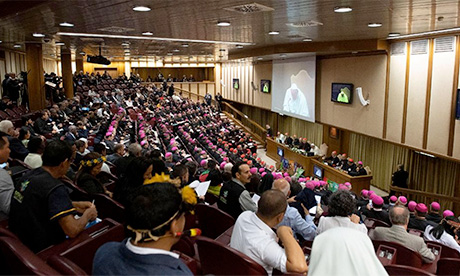The good news: Pope Francis named Xaverian Sr. Nathalie Becquart as undersecretary to the Vatican’s office of the Synod of Bishops, possibly with voting rights.
The other news: the second undersecretary named, Augustinian Fr. Luis Marín de San Martín, will become a bishop.
The more things change. …
Still, it is important to have a woman’s voice near the top, and the fact that Sr. Becquart will likely have a vote makes an important statement about the role of the nonordained.
Trusting the pandemic will end by then, Pope Francis is calling a synod for October 2022 to discuss synodality.
To discuss what?
Synodality.
Essentially, it means moving along together.
The concept revolves around the way the church has — or seems to have — made decisions over the centuries.
So, while no one knows exactly who will be called to Rome, we can be assured it will be bishops.
Judging from the experience of the most recent synod —an extraordinary synod that considered the church in the Pan-Amazon Region —women may be called as well. Whether they will have a vote remains to be seen.
The theme for October 2022 is “For a synodal Church: communion, participation and mission.”
The synod members’ task, be they male or female, religious or secular, clerical or lay is to enter into a serious discernment about how the church (communion) — that would be the whole church (participation) — can move along (mission) in the light of the Spirit.
The keyword here is discernment.
So, a synod on synodality is not so much to make decisions as to take decisions about how the church can make decisions and eventually take decisions.
Sound confusing?
Of course.
Church is a messy business, and if it were not of divine origin it would have gone the way of hundreds of bankrupt corporations throughout the ages.
And the key word, as I said, is discernment.
Francis often speaks about the genuine need for discernment as the church continues to move, grow and develop.
When the International Theological Commission published its long exegesis on discernment in March 2018, it buried the lede in its Paragraph 114:
Discernment must be carried out in a space of prayer, meditation, reflection and study, which we need to hear the voice of the Spirit; by means of sincere, serene and objective dialogue with our brothers and sisters; by paying attention to the real experiences and challenges of every community and every situation; in the exchange of gifts and in the convergence of all energies in view of building up the Body of Christ and proclaiming the Gospel; in the melting-pot of feelings and thoughts that enable us to understand the Lord’s will; by searching to be set free by the Gospel from any obstacle that might weaken our openness to the Spirit.
So, discernment is the key, not law.
Discernment is the process, not parliamentary procedure.
Discernment is the means, not power trades.
Coupled with a genuine understanding of discernment, the interrelated words in the coming synod’s theme — communion, participation and mission — present an exciting possibility for the post-Vatican II church led by Francis.
They also present attractive targets for the church’s hardliners.
Without doubt, the ecclesial alt-right is often directly tethered to the political alt-right, and not only in the United States.
Watch the infighting in Germany.
See the ecclesial-political scramble in Poland. Compare the weak U.S. bishops’ conference response to the Jan. 6 Capitol insurrection with their outright attack on President Joe Biden.
Add to the mix the church’s growing lunatic fringe — the priest-bloggers, amateur exorcists and nasty “Catholic” media in the U.S. and elsewhere — and the prospect of synodality seems dim indeed.
Will the fringe get a hearing?
In fact, genuine discernment requires attention to all voices, even those of cacophony.
What do they want?
Where do they come from?
Sometimes the screech means the car is going off the road. And sometimes it means it is being driven off the road on purpose. Which is it?
Catholicism has always had a very big tent. Continue reading
